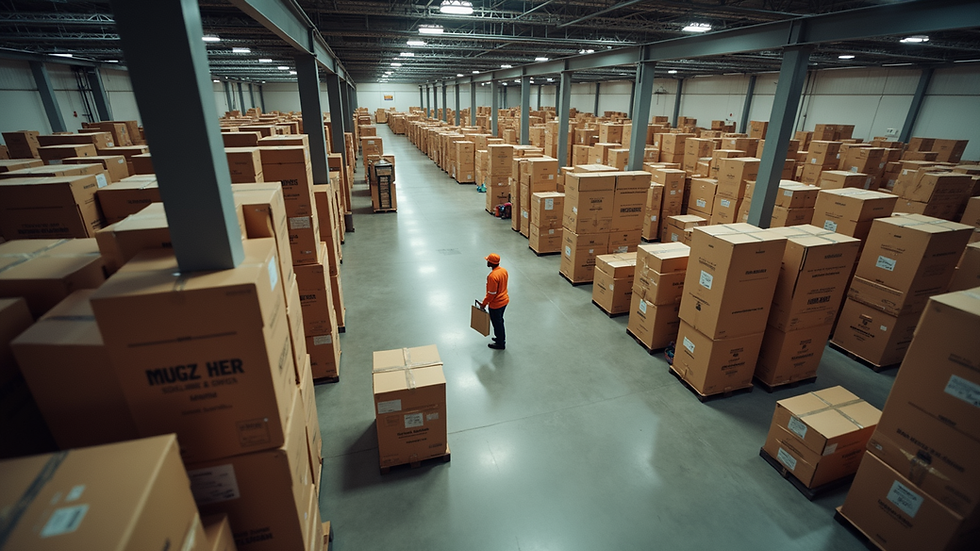Ensuring Ethical Practices in Global Supply Chains: Forced Labor Prevention
- Schulz Trade Law

- Oct 26, 2025
- 4 min read
In today's interconnected world, global supply chains are the backbone of many industries. However, with complexity comes the challenge of ensuring ethical practices throughout every stage of production.
One of the most pressing concerns is the prevention of forced labor, which remains a significant human rights issue worldwide. Companies and governments alike are increasingly focused on creating transparent, responsible supply chains that respect workers' rights and promote fair labor standards.

The Importance of Forced Labor Prevention in Supply Chains
Forced labor is a severe violation of human rights where individuals are coerced to work under threat, without the freedom to leave. It can occur in various industries, including agriculture, manufacturing, and mining. Preventing forced labor is not only a moral imperative but also essential for maintaining brand reputation and complying with international laws.
Businesses must take proactive steps to identify and eliminate forced labor risks in their supply chains. This involves conducting thorough audits, engaging with suppliers, and implementing strict codes of conduct. For example, companies can use third-party verification services to assess labor conditions and ensure compliance with ethical standards.
Key actions for forced labor prevention include:
Mapping the entire supply chain to identify high-risk areas
Training suppliers and employees on labor rights and ethical practices
Establishing grievance mechanisms for workers to report abuses safely
Collaborating with NGOs and governmental bodies to improve labor conditions

Strategies for Effective Forced Labor Prevention
To effectively prevent forced labor, companies need a multi-faceted approach that combines technology, policy, and human oversight. Transparency is critical; businesses should demand full disclosure from suppliers about labor practices and working conditions.
Technological tools such as blockchain can enhance traceability, allowing companies to track products from raw materials to finished goods. This technology helps verify that no forced labor was involved at any stage.
Policy measures include adopting international labor standards like those set by the International Labour Organization (ILO). Companies should also align their internal policies with these standards and ensure they are enforced consistently.
Human oversight remains vital. Regular on-site inspections and worker interviews provide insights that technology alone cannot capture. Empowering workers through education and support networks also helps prevent exploitation.

What is the Uyghur Forced Labor Prevention Act 2025?
The Uyghur Forced Labor Prevention Act 2025 is a significant legislative measure aimed at combating forced labor in global supply chains, particularly focusing on the Xinjiang region of China. This act prohibits the import of goods produced wholly or in part by forced labor from this region, reflecting growing international concern over human rights abuses.
The law requires companies to conduct rigorous due diligence to ensure their products do not contain materials sourced through forced labor. Failure to comply can result in severe penalties, including import bans and legal action.
This act has heightened awareness and urgency around forced labor prevention, pushing companies to strengthen their supply chain transparency and ethical sourcing practices.

Practical Steps for Businesses to Comply with Forced Labor Prevention Laws
Compliance with forced labor prevention laws requires a structured and ongoing effort. Businesses should start by conducting comprehensive risk assessments to identify vulnerable points in their supply chains. This includes evaluating suppliers, subcontractors, and raw material sources.
Steps to ensure compliance:
Develop a clear policy on forced labor prevention that aligns with international standards.
Implement supplier codes of conduct that explicitly prohibit forced labor.
Conduct regular audits and inspections using independent third parties.
Train procurement teams and suppliers on recognizing and addressing forced labor risks.
Establish transparent reporting mechanisms for workers and stakeholders.
Engage with local communities and NGOs to support ethical labor practices.
By embedding these practices into their operations, companies can reduce legal risks and contribute to global efforts to eradicate forced labor.

Building a Sustainable and Ethical Supply Chain Culture
Creating an ethical supply chain is not a one-time task but a continuous commitment. It requires fostering a culture of responsibility and accountability at every level of the organization. Leadership must prioritize ethical sourcing and allocate resources to support these initiatives.
Encouraging transparency and collaboration with suppliers helps build trust and shared values. Companies should also invest in capacity-building programs to help suppliers improve labor conditions and comply with regulations.
Moreover, consumers are increasingly demanding ethically produced goods. Transparent communication about supply chain practices can enhance brand loyalty and market competitiveness.
By integrating forced labor prevention into corporate social responsibility strategies, businesses can drive positive change and promote human dignity worldwide.
Ethical supply chains are essential for a fair and just global economy. By adopting robust forced labor prevention measures, companies not only protect vulnerable workers but also strengthen their own resilience and reputation. Staying informed about laws like the uyghur forced labor prevention act and implementing practical strategies will ensure businesses lead the way toward a more ethical future.
Resource Library
We have a series of articles highlighting the key components of international trade and compliance.
Contact Us
Contact Us
Stay ahead of trade law changes!
Contact us today for guidance on tariffs and regulations to safeguard your business.







Comments